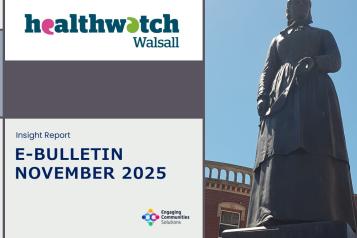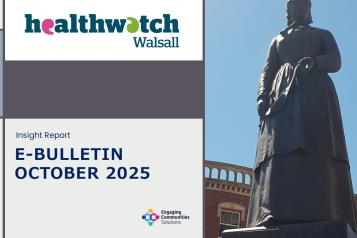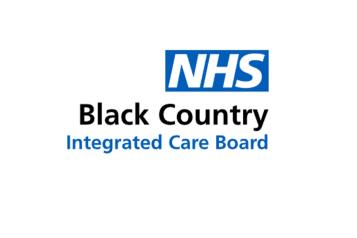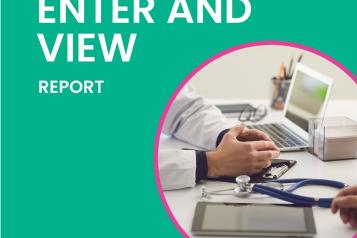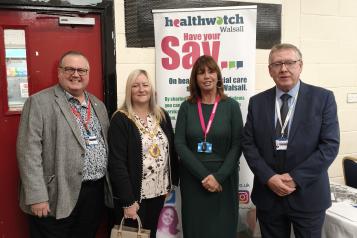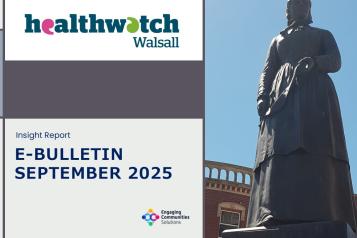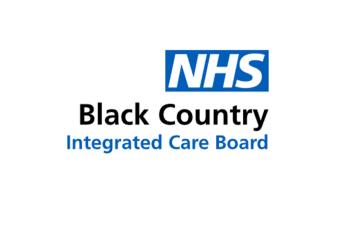Shared views on the future of stroke rehabilitation services for Walsall and Wolverhampton patients.
The Trust are currently planning important changes to how stroke rehabilitation is delivered, with a greater focus on personalised care and improved support in the community. Patient feedback will play a vital role in helping us shape a service that meets the needs of patients, carers, staff, and the wider community.
What’s changing?
Stroke rehabilitation services across Walsall and Wolverhampton are set to be transformed to provide patients with more timely and personalised support.
The proposed approach is in line with the NHS 10 Year Plan to deliver more proactive, community-based care and reduce reliance on hospital-based services. While bed-based rehabilitation would still be available for those who need it, this will be for shorter periods, with most patients continuing their recovery at home or in local community settings. The bed-based rehabilitation service is proposed to move from Hollybank House in Walsall to West Park Hospital.
This will allow resources to be reinvested into a more responsive community rehabilitation service in Walsall and Wolverhampton, helping ensure more patients receive the right care, in the right place, at the right time.
The new model aligns with the national Integrated Community Stroke Service (ICSS) framework and will be delivered by a skilled multi-disciplinary team including Physiotherapists, Occupational Therapists, Nurses, Psychologists, Social Care, and Speech and Language Therapists.
Key benefits of the new model include:
Faster access to rehabilitation after hospital discharge
Personalised care delivered in the most appropriate setting
Seven-day access to specialist stroke rehabilitation
Shorter hospital stays where safe and appropriate
More efficient use of NHS resources, reinvested into community care
Frequently Asked Questions
1. Why are changes being considered for stroke rehabilitation services?
These proposals are part of a wider NHS commitment to deliver more personalised, proactive, and community-based care. The aim is to support stroke patients to recover more quickly and fully, by providing specialist rehabilitation in their own homes or local communities.
2. What is the proposed new model of stroke rehabilitation?
The proposed new model focuses on delivering an increased level of rehabilitation support at home or as close to home as possible. Patients would receive care from a seven-day specialist team, helping them regain independence and improve long-term outcomes. Bed-based care would still be available for those that need it, but for shorter periods and only when necessary.
3. What is the Integrated Community Stroke Service (ICSS)?
ICSS is a national model that combines early supported discharge and community stroke rehabilitation into one joined-up service. It is delivered by a multi-disciplinary team of professionals including Physiotherapists, Occupational Therapists, Nurses, Speech and Language Therapists, Psychologists, and Social Care staff.
4. How will this benefit stroke patients?
Key benefits for patients include:
• Faster access to rehabilitation after hospital discharge
• More personalised and coordinated support in familiar settings
• A focus on independence and wellbeing
• Better long-term recovery outcomes
5. Will hospital-based (bed-based) rehabilitation still be available?
Yes. For patients who need it, bed-based rehabilitation will still be available, this will be for shorter periods. Most patients will transition to community-based care sooner – care closer to their homes in the borough of Walsall or Wolverhampton - supporting a quicker return to independence and better long-term outcomes.
6. Where is it proposed that the bed-based care moves from, to?
Bed-based stroke rehabilitation services are proposed to move from Hollybank House in Walsall to West Park Rehabilitation Hospital in Wolverhampton. This proposed move would help redirect resources to enhance community rehabilitation services and ensure bed-based care is provided within a specialist rehabilitation hospital.
7. Why does West Park Rehabilitation Hospital Wolverhampton need to be considered for bed based services currently provided in Walsall?
Hollybank House is no longer fit for purpose and we need to do more to support patients to be cared for in their own homes and communities. This presents the opportunity to look at how stroke services are delivered in Walsall and Wolverhampton with a view to moving to a community based model to improve care quality and make the best use of staff and resources. This approach is in line with the NHS 10 year Plan to help deliver better outcomes by bringing specialist teams and equipment together and moving more services from hospital into community.
8. Will this affect the quality of care?
No, the quality of care will be maintained or improved. Services will be delivered by specialist, multi-disciplinary teams using evidence-based best practices. Patients will have access to expert care 7 days a week, tailored to their individual recovery goals.
9. How does this align with the NHS Long Term Plan?
This transformation supports the NHS 10 Year Plan’s goal of reducing reliance on hospitals and investing more in community-based, proactive care. It also aligns with national standards for stroke rehabilitation.
10. What happens if I or a loved one can’t be supported at home?
If a patient is not ready to return home, they will continue to receive care in an appropriate bed-based rehabilitation setting, with a plan in place to support their eventual return to the community when ready.
11. When will these proposed changes take place?
Implementation would happen in phases, with clear communication to patients, families, and staff at every stage.
12. What would happen to the staff teams at both sites if this proposal goes ahead?
Our workforce is crucial in terms of recruitment, development of roles, relationships and the commitment to work differently. There will be no loss of jobs as a result of these proposed changes, but some staff may need to work differently or be redeployed to another setting in either Walsall or Wolverhampton. We commit to working with staff on the proposed model and will need to invest in additional therapy staff to increase the level of community service provision.
13. Will this change affect families who need to travel to visit loved ones receiving bed-based care?
We recognise that travel and accessibility are important concerns for families, especially those on low incomes. While West Park Rehabilitation Hospital is in Wolverhampton, we are committed to supporting families during this transition. For those who may face financial challenges, we will assess eligibility for travel cost reimbursements through the NHS Healthcare Travel Costs Scheme.
In addition, in some cases four-week bus passes may be available, supported by the Transport for West Midlands Bus Service Improvement Programme, to help ease the cost of regular travel. We will ensure visiting arrangements remain flexible and compassionate, and we will continue to explore further ways to support families throughout this change
